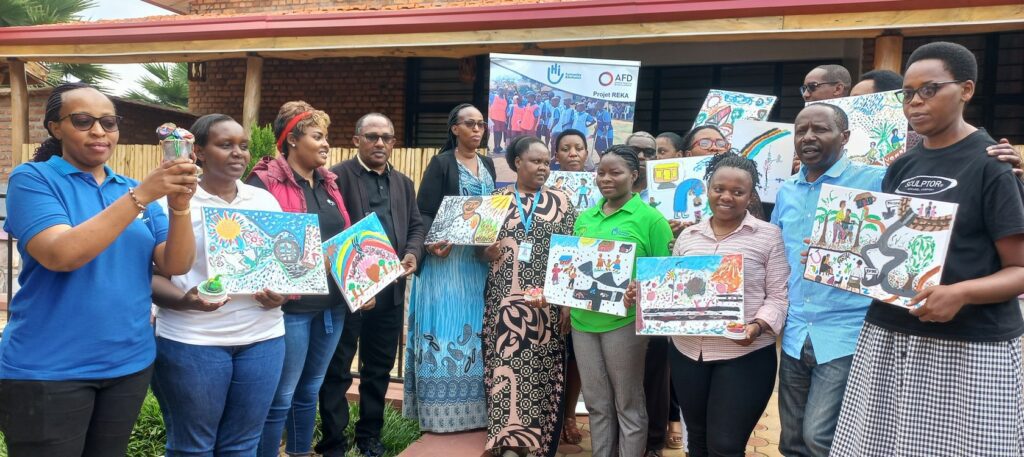“Reka” means “stop” in Kinyarwanda. In short, to stop violence, a major concern in Rwanda, where, in a nationwide study conducted in 2017, 37% of young women reported they were victims of violence. Women and girls with disabilities are the most affected by this violence: they are up to ten times more likely to be victims.
Launched at the end of 2022 in the districts of Kirehe (Eastern Province) and Rutsiro (Western Province), the Reka project fights violence by promoting prevention, care, and resilience among the people it supports. In addition to offering them medical and legal support, Reka uses games, sports and artistic expression to help them express themselves and rebuild their lives. Through discussions, fun activities and theme-based games to raise awareness, children are able to put words to their feelings, interact with others, and gradually regain confidence.
Making victims active stakeholders in the project
Victims or survivors of violence are often perceived as vulnerable people. But Reka gets them involved in its project activities, both as beneficiaries and key players, with the goals of changing attitudes in their communities and improving responses to violence. Reka workers are mobilized to support this process of change.
Find out more: With Proparco, Gender Equality is Moving Centre Stage in the Bangladesh Textile Industry
“As part of Reka, 72 community volunteers have been trained to support survivors of gender-based violence,” says community health worker, Innocent Tuyisenge. “My colleagues and I have begun to conduct awareness-raising activities in their communities, at citizen forums known as ‘Inteko z’Abaturage’. We’re also making referrals to the Isange One Stop Center, which offers psychosocial, medical, and legal care to victims, as well as helping young pregnant girls in their reinsertion process.”
Among the women and girls to have taken part in the Reka project is Chantal, aged 19.
In 2022, when I was 17, I became pregnant after being raped. My mother did everything she could to have my attacker arrested, but he fled the country. Then she got angry with me and chased me from home. My child was accepted nowhere, and his birth wasn’t legally recorded.
After that I was sad, very anxious, and thought my life no longer had meaning. I blamed myself a lot! My family and neighbors called me a prostitute. I found myself totally isolated and had no information about my rights or those of my son.
With the Reka project, I felt listened to. I learned that I’m not guilty of anything, that I’m actually a victim, and that children have rights. A Reka worker helped me claim those rights, and legal proceedings are underway.
I was lucky enough to represent my peers on the Children’s Advisory Committee. During our first meeting, I realized that it was possible for me to go back to school. Encouraged by the professionals of the project, I made the decision to go back to school, strongly determined to complete my studies so I could have a better life in the future. At school, I’m a member of the protection club, and I’m active in raising awareness among my peers about violence they may suffer.
As for my family, my mother is a member of the parent self-help group on education in positive parenting. After the training courses on violence and children’s rights, she supported my return to school. She also looks after her grandson, even though she also has to work.
I’m very happy now: I can imagine a future for myself because I’m well informed about my rights. And I’ve already taken on a new life challenge for my future and the future of my whole family.
In addition, 40 school assistants have received training in protecting children from violence and in conducting awareness-raising activities via games and sports. These school assistants pass on their practices in turn to the six “protection clubs” set up in primary and secondary schools to create a safer school environment for children.
Children are encouraged to participate in the monitoring and evaluation of the Reka project, both in their communities (via advisory committees) and in their schools. They’re also encouraged to take part in national and local advocacy actions targeting decision-makers.
The Reka project is put into action by Handicap International (Humanity and Inclusion in English)/ Humanité & Inclusion, Play International and Caritas. It is cofinanced by AFD’s CSO Initiatives Facility.
Source link : https://www.afd.fr/en/actualites/confronting-gender-based-violence-rwanda-and-reigniting-hope-future
Author :
Publish date : 2024-03-18 07:00:00
Copyright for syndicated content belongs to the linked Source.
